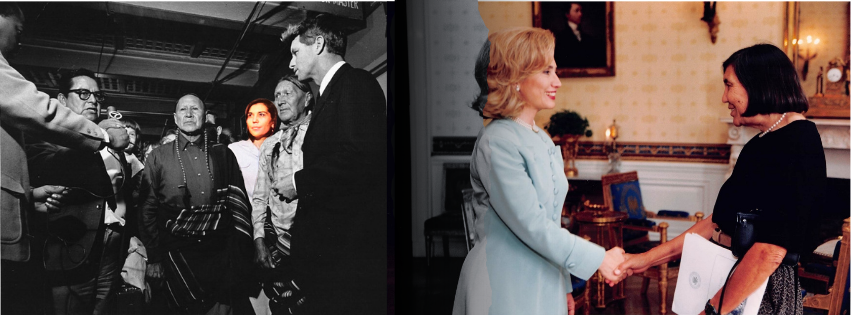
During the 13th Annual Cherokee Indian Hospital Foundation Gala we honored Susan Crowe, the third recipient of the Lula Owl Gloyne Person of Excellence Award. The Person of Excellence Award serves to honor the legacy of advancing the health and wellbeing of the Eastern Band of the Cherokee Indians that Lula Owl Gloyne left behind. The Cherokee Indian Hospital Foundation joins countless others in mourning the loss of one piece of Lula’s legacy, Mary Lou Gloyne Byler, Lula’s daughter who passed away on May 11 at the age of 95. A citizen of the Eastern Band of Cherokee Indians, Mary Lou was a trailblazer in Native literature & advocacy, co-editing key works & championing Native rights. Following in her mother’s footsteps, Mary Lou lived a life of extraordinary service and advocacy.
Mary Lou Gloyne Byler, a staunch advocate for Native American rights, was born on August 30, 1928, to the late Lula Owl Gloyne and Jack Freize Gloyne, Mary Lou’s life was a testament to dedication and passion for both literature and the rights of indigenous peoples.
Growing up in Cherokee, Mary Lou embraced her heritage from an early age. Her academic journey took her to the University of Oklahoma, where she earned her BA degree. It was the beginning of a lifelong commitment to education and advocacy. Shortly after her graduation, Mary Lou ventured to New York City, a move that would set the stage for a remarkable career in publishing. She joined the esteemed ranks at American Heritage, the oldest magazine dedicated to American history, where she honed her skills as an editor. It was here that she met her husband, Bill Byler, a like-minded advocate and writer for Yale University Press.
Mary Lou’s professional life was marked by significant achievements, particularly in her work with Native American literature and rights. In 1983, she co-edited the groundbreaking work, A Guide to Research on North American Indians, alongside Michael Dorris and Arlene Hirschfelder. This extensive annotated bibliography became a critical resource in Native American studies.
Mary Lou’s advocacy extended beyond the literary world. She and Bill were instrumental in the Association on American Indian Affairs, where Bill served as executive director. Their efforts were pivotal in the passage of the Alaska Native Claims Act in 1971, a historic piece of legislation that returned 45 million acres to Alaskan Native communities. Their activism also supported water rights for the Havasupai and San Carlos Apache tribes, highlighting their deep commitment to justice for Native populations.
Perhaps one of her most profound impacts was on the portrayal of Native Americans in children’s literature. Mary Lou was a vocal critic of the stereotypical representations prevalent in the genre and worked to promote a more authentic narrative. Her publication, American Indian Authors for Young Readers, emphasized the importance of indigenous voices in literature, stating, “Only American Indians can tell non-Indians what it is to be Indian.”
Beyond her professional endeavors, Mary Lou was a woman of many talents and a beloved figure in every community she touched. Known for her sharp intellect, keen observation skills, and gentle humor, she was also an accomplished practitioner of Taichi, which she practiced well into her later years.
As we remember Mary Lou, we celebrate a life well-lived, dedicated to the preservation of culture and the empowerment of the Native American community. Like that of her mother, Mary Lou’s vision and voice will continue to inspire future generations, echoing her belief in the power of indigenous storytelling and the importance of safeguarding heritage. Mary Lou Byler’s life was a beacon of hope and a reminder of the strength inherent in quiet, steadfast commitment to one’s principles and passions.